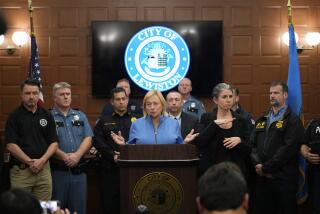South Korean race is a liberal-free zone
Fortune tellers are taken seriously in South Korea. But in a country renowned for the volatility of its politics, those who claim clairvoyance in matters of money and love are being cautious about predicting the winner of this year’s presidential election.
On websites and in interviews, the country’s top fortune tellers have been saying that, with the vote still 11 months away, the outcome is inscrutable. Unexpected candidates may emerge, they say. Or a front-runner may founder.
Take fortune teller Nam Deok, who gazed into the future of front-runner Lee Myung-bak of the opposition Grand National Party and saw no sure thing.
“His course of fortune rose in 2006, but it will get tough in 2007,” Nam wrote on his website.
Mere superstition, Lee’s people scoff. They point to the science of polling, where things appear much clearer, give or take a few percentage points.
A Gallup Korea poll released Monday said the former Seoul mayor had the backing of half of the decided voters; other polls have his support even higher.
Polls show that Lee’s closest challenger is Park Geun-hye, the daughter of a former president and also a member of the conservative Grand National Party, or GNP.
Either way, it is not difficult to predict that the liberal left’s decade-long grip on the presidency will end this year. The governing Uri Party is a shambles, crippled by factional fights and wounded by disillusionment with President Roh Moo-hyun, whose approval ratings have dipped below 10% in some polls.
Uri Party’s decline
Roh is constitutionally banned from running for another five-year term, but the disarray in the Uri camp is so deep that the party is poised to take an extraordinary step before the next election: It plans to dissolve. The Uri Party’s biggest factions say they will give themselves a new name and seek an alliance with other liberal and regional parties.
South Korea’s liberals have no credible presidential candidate to challenge Lee or any other GNP candidate. Neither of the Uri Party’s two prospective candidates is on the voters’ radar. And last week, the leading moderate candidate for president, independent Goh Kun, a former prime minister, withdrew from the race, citing his inability to build momentum.
“For nearly one year I tried to find a politics of harmonious coexistence, but I realized that my ability was not enough to do so in this confrontational structure,” Goh said in a statement.
He was right about one thing: South Korean politics are a nasty, polarizing business.
Take the case of Roh, who was elected four years ago on a youth-driven, Internet-fueled populist wave. Many on the political left now share the contempt and ridicule that the conservative opposition and media allies have thrown his way.
The euphoria that brought Roh to power has crashed on the rocks of political scandals and a national mood defined by high stress levels. The days of celebrating South Korea’s rise to the world’s 12th-largest economy have given way to anxiety.
Soaring prices have placed homeownership out of the reach of millions. Middle-class parents struggle to pay for the private education or tutoring they think their children need to stay competitive.
And North Korea’s underground nuclear test in October was a blow to the credibility of the government’s policy of engagement, which has used aid and investment to try to foster better economic connections and trust between the nations.
The policy is a cornerstone of the Roh government, but it always grated on the Bush administration, which favored a harder line with the regime in Pyongyang. Roh also has played the good ally by continuing to station South Korean troops in Iraq.
Conservatives accuse the president of weakening the country’s security relationship with the U.S. with what they describe as his coddling of an incorrigible North Korean regime.
Future of engagement
It is uncertain whether a change of government, if it comes, will drastically alter South Korean policy toward Pyongyang. After a decade of offering North Koreans a hand instead of a fist, there is a lot of public support for engagement. Even some conservatives are reluctant to return to Cold War ways.
“Engagement is acceptable and should be continued,” said Sohn Hak-kyu, another GNP presidential contender who trails Lee and Park by wide margins in the polls but is seen by some as a candidate who can attract moderate voters. “The problem is that this government just gives aid to North Korea without a strong will to reform and change North Korea. That is the reason it has lost the confidence of the Korean people and the international community; we have to maintain principles on human rights.”
Sohn has not managed to reach double-digit support in the polls. But he notes that it is a long campaign and South Korean politics are remarkably fluid.
Economic issues are on most voters’ minds, he said, “but the issue of war and peace could grow as the election comes closer.”
Much could change.
Lee and Park’s sharpelbowed rivalry could split the conservative vote, with one or the other running as an independent if they failed to win the GNP nomination.
There is also talk in Seoul about a possible summit with Roh and North Korean leader Kim Jong Il as a way to demonstrate that engagement still has benefits. Some argue the drama of a Korean summit could be an adrenaline boost for a liberal candidate.
And Roh has hinted that he might quit before his term is up, a move that could lance some of the antipathy toward his party.
There are enough unpredictable scenarios, in other words, to keep the fortune tellers off balance.
*
More to Read
Start your day right
Sign up for Essential California for news, features and recommendations from the L.A. Times and beyond in your inbox six days a week.
You may occasionally receive promotional content from the Los Angeles Times.






